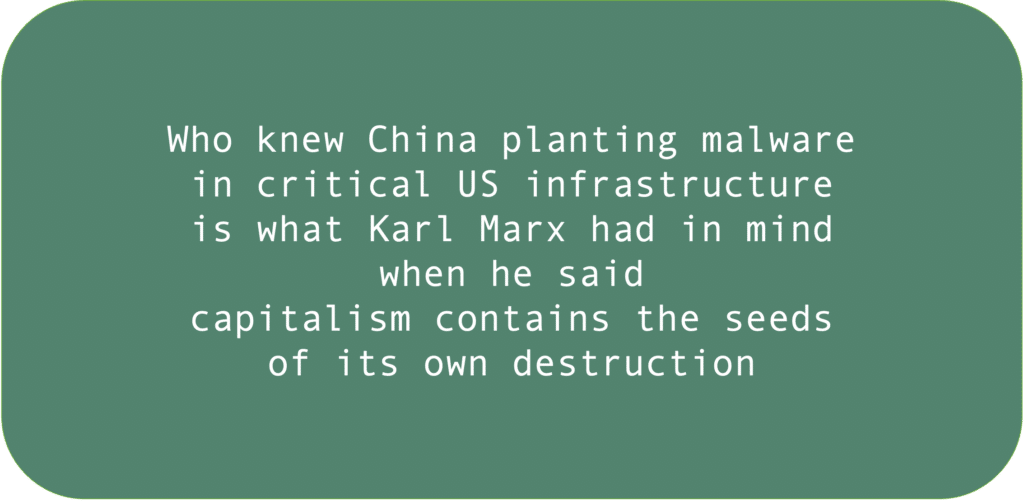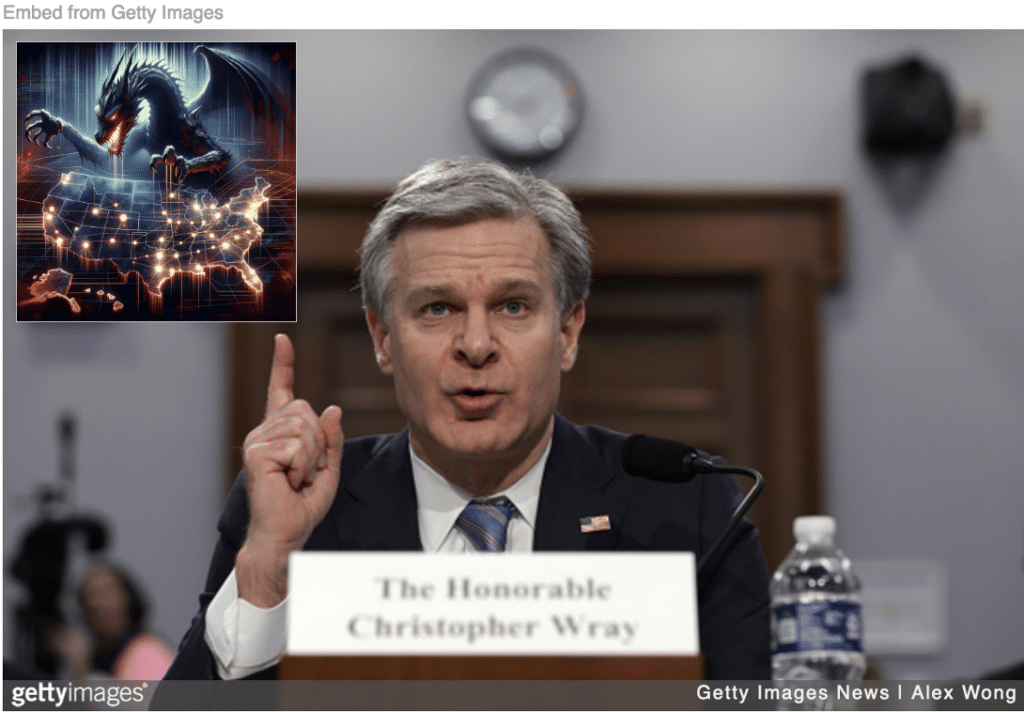 The Chinese Dragon as cyber virus
The Chinese Dragon as cyber virus
On Wednesday, when FBI Director Chris Wray began his congressional testimony, everyone expected to hear boilerplate law-enforcement concerns. Instead, Wray issued warnings about Chinese espionage and digital warfare that shocked the world.
‘China’s hackers are positioning on American infrastructure in preparation to wreak havoc and cause real-world harm to American citizens and communities, if or when China decides the time has come to strike. …
‘[T]hey target our freedoms, reaching inside our borders, across America, to silence, coerce, and threaten our citizens and residents’ Wray told the House Select Committee on the Chinese Communist Party.
(CNN, January 31, 2024)
To substantiate his warning, Wray detailed a foiled Chinese plot to plant malware capable of crippling US civilian infrastructure with just a few clicks on a keyboard. He portrayed a scene out of a spy thriller. But forget James Bond; this is real life, and the stakes couldn’t be higher.
China’s long-term cyber strategy
Except that nobody should have been shocked. To explain why, I need only cite the title of a commentary I published over a decade ago:
- “Obama to Lecture China’s Xi on Cyberspying…? Puhleeese” on June 4, 2013
Indeed, that Wray still has cause to warn America about China’s cyberwarfare is a testament to the cynicism I expressed back then.
The problem stems from US ambivalence towards China since Nixon’s diplomatic overtures and China’s entry into the WTO. The US has treated China like a frenemy – one part trade partner, one part geopolitical rival. But Wray’s testimony makes clear that China has always seen the US solely as an enemy.
Specifically, China has treated the US like a clueless mark. After all, for decades, China has gotten away with systematically stealing the intellectual property of US corporations – from defense contractors and chip makers to fast food chains and fashion designers.

Wray is now warning about the potential to turn off electricity, pollute drinking water, and paralyze transportation systems with just a few clicks.
Wray did not say. However, military analysts posit that China is fixing the battlefield to keep the US at bay when it invades Taiwan. Mind you, Russia’s ill-fated invasion of Ukraine makes that less likely. This isn’t just about control; it’s about ensuring it can so destabilize and cripple the US that it is unable to respond effectively.
The opioid parallel: weaning off China’s economic high
As indicated, decoupling from China might be as challenging as fighting the opioid epidemic. But Wray leaves no doubt that doing so is now an existential imperative.
That’s why assuming the risk of continued Western reliance on China is like being in a collective suicide pact. It’s high time we kicked this reliance, and fast.
It’s hard to imagine Wray’s testimony being a more alarming wake-up call than Obama feeling compelled to lecture Xi. But the US must start treating China with the same caution and strategy it reserved for the Soviet Union. If not, we risk finding ourselves in the dark, both literally and metaphorically.
Cold War II
Still, the cold, hard truth is that the US must begin dealing with China like it did with the Soviet Union during the Cold War. After all, China is planting malware on US infrastructure like an enemy mining enemy territory.
The current strategy involves leading Western nations in “de-risking” their economies. They aim to avert COVID-like disruptions in essential product supply by shifting manufacturing to the US or EU. Yet, this approach is akin to giving criminals a pass, provided the cap on each theft is $1000. This is essentially death by a thousand cuts; a classic case of being penny-wise and pound-foolish
Instead, Wray’s warnings should compel Western countries to decouple their economies. The aim would to be no more invested in China today than they were in Russia during the Cold War. That, of course, is a daunting ask or task. After all, US corporations are as addicted to Chinese markets (low-costs, high profits, cheap goods) as ordinary citizens are to Chinese drugs (opioids like fentanyl).
That said, recent history offers hope. Because we need only look at how Western companies pulled out of Russia after it invaded Ukraine.
Above all, though, Wray’s testimony was conspicuously light on details about what the US is doing in China. But I am convinced that the US is capable of mutually assured destruction (MAD) in this respect.
That, of course, is based on the concept of MAD deterrence, which has kept nuclear powers from daring to attack each other for over 70 years. So don’t lose any sleep over this…